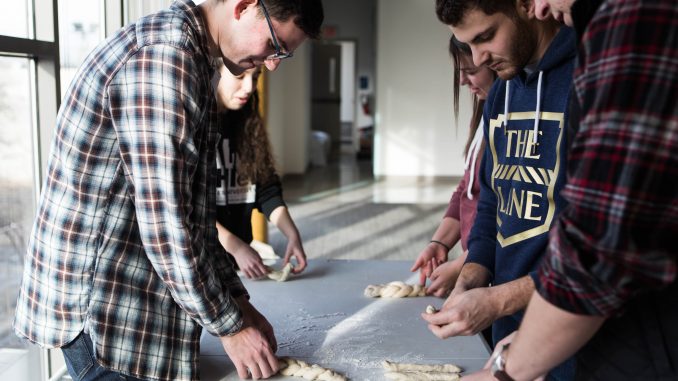
Two out of three college students are food insecure, according to a March 2017 report by the Wisconsin HOPE Lab and the Association of Community College Trustees.
The results of this study surprised Gadi Zimmerman. He first learned about it on social media from Sara Goldrick-Rab, a higher education professor who researches food insecurity among college students.
If someone is food insecure, it means they have a lack of reliable access to affordable, nutritious food.
“I knew that so many students were unaware of this issue and didn’t really know that this is an issue on college campuses,” said Zimmerman, a junior financial planning major. “It’s passionate for me because these were my peers that were affected by this issue and no one was really talking about it, no one on campus at least.”
Zimmerman is the president of Temple’s chapter of Challah for Hunger, which currently has 20 members.
Challah for Hunger is a national organization with more than 80 chapters around the world, which all work toward social justice by currently focusing on food insecurity on college campuses. Each of their chapters bake and sell challah, a traditional Jewish bread. The profits will be used to fund a food pantry on Main Campus.
Zimmerman decided to tackle food insecurity on campus after his sister-in-law, Carly Zimmerman, the CEO of the organization, encouraged him to get involved with the small chapter on Main Campus, run by Hillel at Temple, the Jewish student center on Norris Street near 15th.

Carly Zimmerman became involved with the student organization as an undergraduate at the University of Pittsburgh in 2007. She helped a group of volunteers bake and sell challah and discuss issues related to food insecurity, like access to food for women and children during the genocide in Sudan.
“I actually wasn’t a very good challah baker,” she said. “But I saw that food was a really good way to get people together to talk about these issues, and that’s what meant a lot to me, that people not only understand and care about these social justice issues, but they felt like they could do something about it.”
Temple’s chapter of the organization has weekly meetings on Thursdays to discuss group promotion strategies. Every other Thursday during the semester, they bake challah at Hillel and sell it in the Student Center for $3.
Chaviva Galapo, a sophomore legal studies major, is the baking coordinator of the organization, and she is mostly involved with teaching, supervising and helping the other members bake and sell challah.
“During our off weeks when we’re not cooking, we discuss food insecurity and how we can change the culture on our campus from one in which [food insecurity] is never talked about, to one in which everyone feels comfortable and wants to help their fellow friends,” Galapo said.
Their baking ingredients are donated anonymously by a wholesale restaurant company in the Philadelphia region.
Half of all the challah sale proceeds from Challah for Hunger are donated to MAZON, a world hunger relief organization. The other half is donated to a local organization of a chapter’s choice.
Temple’s chapter donates to the university’s Student Emergency Aid Fund, which provides financial assistance to students in serious times of need. The fund is facilitated through the Office of Student Affairs and donations are earmarked for a food pantry on campus.
Throughout the past year, Temple’s Challah for Hunger has raised more than $1,000 and donated $423 to the Student Emergency Aid Fund, Gadi Zimmerman said.
“We really believe in the power of collective giving, so when 81 of our chapters donate to one non-profit that they agreed upon together and they’re able to give $75,000 in one year, that’s really significant,” Carly Zimmerman said.
In its first years, Challah for Hunger focused nationally on combating food insecurity among women and children during the genocide in Sudan, which started in 2003. Their proceeds from selling challah went to hunger relief for women and children in the country.
During the past decade, the organization has changed its focus to raising awareness and funds for food insecurity among college students on their campuses.
“It was really important for us to show, not only our students, but the wider community that hunger isn’t just something you see on TV, not just the person asking for money or food on the streets, but it could be someone who’s sitting in class next to you,” Carly Zimmerman said.
Challah for Hunger at Temple has been in partnership with Temple Student Government to get more students involved this semester.
Challah for Hunger will host an event with TSG on Feb. 19. It will be focused on food insecurity on college campuses. There will also be a month-long fundraiser starting on Thursday through OwlCrowd, the university’s crowdfunding campaign. The funds will go toward a food pantry opening on Main Campus.
“We hope that as [more] students understand that this is an issue, that the stigma around food insecurity will change and more people won’t feel shameful for being food insecure,” Gadi Zimmerman said.



Be the first to comment